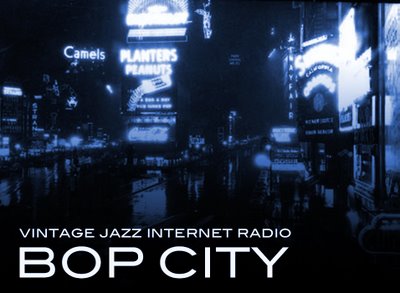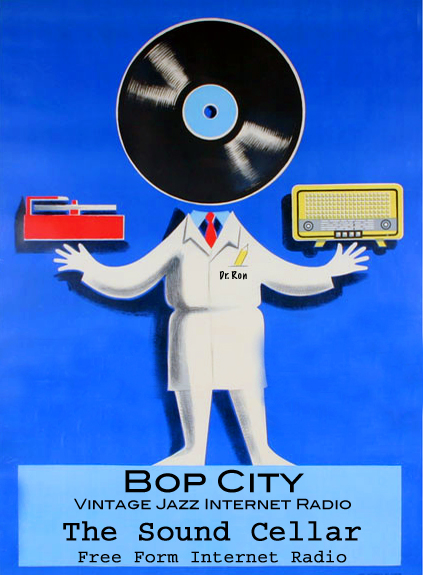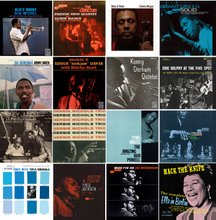Today, July 15, 2007 was supposed to be the day internet radio died. Thanks to actions from listeners from around the world and a hard line by Live365, we're still streaming classic jazz to the world.
Live365 has decided that they are not going to pull the plug today. By standing firm, they were going to force Sound Exchange's (SX) hand to use the legal system to shut them down. Sound Exchange and their associated culprits realized that they could not withstand the public outcry if they took legal action against live365 and backed off.
Congress has stepped in with a temporary bill delaying the new performance royalty rates for sixty days so that negotiations can continue between SX and webcasters. Essentially, all parties were called onto the carpet by Congress and a round-table discussion was held in Washington D.C. with various members of Congress and several webcasters. This was a very good thing as SX had been very busy with a strategy of propaganda consisting of half-truths being relayed to Congress and the public. When the details of any proposal that SX had made were uncovered, it was discovered that their "deals" were completely disingenuous and unworkable. One of their offers even required webcasters to give up their rights to pursue existing and future legislation with regard to royalty rates - nothing like dealing with a little extortion while "negotiating."
Distilled, all of this mess comes down to nothing more than a huge effort to not allow control of the distribution of music on the internet by a small contingent of corporations that are only interested in their bottom line. This is a struggle of music lovers versus bean counters and lawyers. This has become more than just about "internet radio."
The folks that stand to lose the most if internet radio goes away are the artists. If the major labels take over internet radio, artists will no longer see performance royalty checks as the labels will direct license their music to label associated stations (see what is happening at last.fm). And, they will lose one of the their only outlets for playing their music for the public's discovery. Independent artists and artists with small audiences will lose big time.
Realizing that satellite radio pays performance royalties as a percentage of revenue and over-the-air radio pays no performance royalties, there are still inequities to be worked out within the scope of the Internet Radio Equality Act (IREA). This fact cannot be ignored.
In summary, it looks like SX's propaganda campaign strategy didn't work. So we're continuing full speed ahead. We're updating the broadcast with more great classic jazz. We've just added the entire LP, Soul Junction by the Red Garland Quintet, featuring John Coltrane and Donald Byrd. What beautiful LP. We just recorded some cuts from Freddie Hubbard's impulse LP, The Body And The Soul. Lurking in our record stack are LPs from The Modern Jazz Quartet (Prestige), Jay Jay Johnson (Blue Note), Gene Krupa (Clef), Jimmy Heath Quintet (Riverside), Jam Session (Verve), Montgomery Brothers (Pacific Jazz), Johnny Hodges (impulse) and Jack McDuff (Prestige) and more.
Thanks for listening to Bop City!

Bop City - Internet Radio's
Jazz Center of the World
Imagine that you are back in the era when jazz was expanding beyond its perceived boundaries - when jazz was an American phenomenon.
Imagine that there is a radio station spinning records on the cutting edge of jazz, giving a nod to the origins of jazz and even sneaking in some blues now and then. Bop City is that radio station.
Why Bop City?
We love classic jazz and we enjoy sharing it with other jazz lovers.
With more and more radio stations dropping classic jazz from their formats, we decided to do something about it by creating Bop City, Vintage Jazz Internet Radio. We present a selection of album oriented jazz that is not easily found and rarely heard on the radio.
Within our playlist, we include entire albums of artists rather than only select cuts. We feel that this gives the listener a better variety of an artists' body of work and results in a playlist with a vibe that ebbs and flows from within. This concept allows our listeners to delve deeper into the world of jazz.
Bop City is Live365's best alternative for classic jazz!
Imagine that you are back in the era when jazz was expanding beyond its perceived boundaries - when jazz was an American phenomenon.
Imagine that there is a radio station spinning records on the cutting edge of jazz, giving a nod to the origins of jazz and even sneaking in some blues now and then. Bop City is that radio station.
Why Bop City?
We love classic jazz and we enjoy sharing it with other jazz lovers.
With more and more radio stations dropping classic jazz from their formats, we decided to do something about it by creating Bop City, Vintage Jazz Internet Radio. We present a selection of album oriented jazz that is not easily found and rarely heard on the radio.
Within our playlist, we include entire albums of artists rather than only select cuts. We feel that this gives the listener a better variety of an artists' body of work and results in a playlist with a vibe that ebbs and flows from within. This concept allows our listeners to delve deeper into the world of jazz.
Bop City is Live365's best alternative for classic jazz!
Sunday, July 15, 2007
Sunday, July 01, 2007
Bop City In The News
Erika D. Smith wrote an excellent article on the plight of internet radio in the Indianapolis Sunday Star. I was interviewed for the article and Erika included a couple of quotes from our discussion.*
The demise of internet radio at the hands of the RIAA and the major labels may well be at hand. If this does happen they will have succeeded in making millions of their customers incredibly upset and the world will have lost an exceptional cultural asset. The music business, what's left of it, will have changed forever in ways that will not be apparent for some period of time. The artists, that have mostly remained silent throughout this fiasco, are the biggest losers. They will have lost an incredibly valuable promotional and distribution outlet.
It may seem like I'm being overly dramatic about all of this, but I really do believe that once the major labels control music distribution on the internet all will be lost. These folks are lawyers and bean counters. They aren't music people. They don't care about how music can enrich lives, how artists can inspire, how music can be an escape from every day drudgery, how music can lift our spirits in times of trouble... all they care about is moving units and maximizing profits. A perfect example of how badly all of this is going, and has gone, is what Mr. Bronfman Jr. has done to the once great Warners Music.
Internet radio is run by music lovers that want to share that love with the rest of the world. In this day and age, this just cannot be allowed.
Que sera sera.
Here's hoping for nothing short of a miracle before July 15, 2007 - the day the music dies.
*Go to our jazz archive to check out all of the countries and citys in the United States. There are some countries that listen to Bop City that we didn't know existed. Maybe we should brush up on our world geography! ;P
A side note to Erika's article...
Something to keep in mind regarding these supposed negotiations between webcasters and SX as requested by Congress...
From RAIN:
One important point to keep in mind, as webcasters are discussing today, that a direct settlement between SoundExchange and webcasters -- what the Small Business Committee (and most of Congress, I'd assume) says it wants -- would only cover the minority of recording artsits for whom SoundExchange is authorized to negotiate. This is not the intended result of a "one-license-to-cover-it-all" statutory rate.
Therefore, Sound Exchange is not able to negotiate blanket royalty rates. So the negotiations that Congress requested Webcasters and Sound Exchange engage in are essentially worthless, unless a webcaster only wants to play the music that Sound Exchange will allow them to play. (Sounds like socialism has come to internet radio - this is what you have to play and this is what you have to pay us to play what we tell you you can play.) This is what it's come to...
The demise of internet radio at the hands of the RIAA and the major labels may well be at hand. If this does happen they will have succeeded in making millions of their customers incredibly upset and the world will have lost an exceptional cultural asset. The music business, what's left of it, will have changed forever in ways that will not be apparent for some period of time. The artists, that have mostly remained silent throughout this fiasco, are the biggest losers. They will have lost an incredibly valuable promotional and distribution outlet.
It may seem like I'm being overly dramatic about all of this, but I really do believe that once the major labels control music distribution on the internet all will be lost. These folks are lawyers and bean counters. They aren't music people. They don't care about how music can enrich lives, how artists can inspire, how music can be an escape from every day drudgery, how music can lift our spirits in times of trouble... all they care about is moving units and maximizing profits. A perfect example of how badly all of this is going, and has gone, is what Mr. Bronfman Jr. has done to the once great Warners Music.
Internet radio is run by music lovers that want to share that love with the rest of the world. In this day and age, this just cannot be allowed.
Que sera sera.
Here's hoping for nothing short of a miracle before July 15, 2007 - the day the music dies.
*Go to our jazz archive to check out all of the countries and citys in the United States. There are some countries that listen to Bop City that we didn't know existed. Maybe we should brush up on our world geography! ;P
A side note to Erika's article...
Something to keep in mind regarding these supposed negotiations between webcasters and SX as requested by Congress...
From RAIN:
One important point to keep in mind, as webcasters are discussing today, that a direct settlement between SoundExchange and webcasters -- what the Small Business Committee (and most of Congress, I'd assume) says it wants -- would only cover the minority of recording artsits for whom SoundExchange is authorized to negotiate. This is not the intended result of a "one-license-to-cover-it-all" statutory rate.
Therefore, Sound Exchange is not able to negotiate blanket royalty rates. So the negotiations that Congress requested Webcasters and Sound Exchange engage in are essentially worthless, unless a webcaster only wants to play the music that Sound Exchange will allow them to play. (Sounds like socialism has come to internet radio - this is what you have to play and this is what you have to pay us to play what we tell you you can play.) This is what it's come to...


